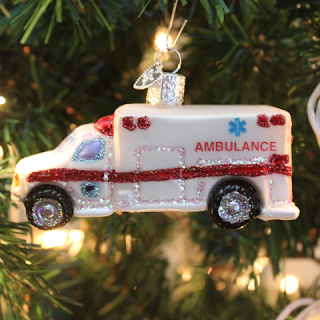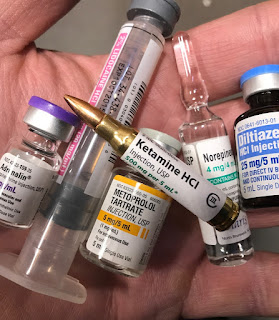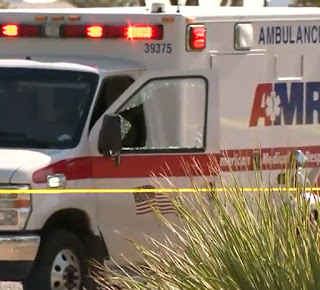The Gifts of Mistake and Ignorance
The tree is up and adorned with the lights of the season and dozens of memories in the form of ornaments. Each ornament signifies some event in our personal or family past - dangling reminders of how much we have changed. New jobs, new children, new friends. Each has a back-story and is significant to us, and that is why we hang them every year - to celebrate where we've been and where we've ended up. Our whole lives are festively suspended from the boughs of an illuminated pine tree. It's a beautiful, if not somewhat curious tradition.
It strikes me that even though Christmas only comes once per year, our memories, habits and attitudes model the Tannenbaum during every day. The things we have done throughout our careers in EMS dangle like invisible ornaments from the trees of our psyche. We attach them to our brains either on purpose, or they are so sublime that they adhered themselves without our blessing. Memories of patients, calls, partners, arguments, physicians- the list is almost endless. And whether it's Christmas or Ramadan, we carry these ornaments with us as shiny memoir baggage.
Like most shiny objects they can distract us. There's a shiny ornament of the first time I walked a CHF patient to the stretcher across the room and consequently ended up intubating her. It jingles in my brain every time I hear rhonchi. Every time I hear a cardiac arrest go out during the holidays I see the ornament with the old Italian lady pushing herself around in circles on a swiveling chair in the living room. She was wailing incoherently while we fruitlessly coded her 70 year old husband right next to the tree on Christmas Eve. Lately, when I hear pediatric calls, I picture my newer ornaments - my beautiful children playing together or snuggling on the couch with my wife and I.
 We can't escape these things. As EMS personnel we are destined to cover our personal trees with countless ornaments. Some are ugly. Some are beautiful. Some we're simply indifferent to, and some of them are educational in nature. It's the educational ones that I am thinking about on this Christmas Eve Eve, because those are truly gifts.
We can't escape these things. As EMS personnel we are destined to cover our personal trees with countless ornaments. Some are ugly. Some are beautiful. Some we're simply indifferent to, and some of them are educational in nature. It's the educational ones that I am thinking about on this Christmas Eve Eve, because those are truly gifts.
Think about how many calls you respond to throughout the course of a year. Then multiply that by the years you've got in. We're talking about an incredible amount of patient contact, especially for a guy or girl with 15 to 20 years on the job. Each call poses special challenges, but also offers a gift. I mean EVERY SINGLE CALL is waiting for you with a wrapped present when you step out of the ambulance. Sometimes the gift is a really interesting story about life in the far past of a geriatric patient. Other times its the reward of a "Thank You" from a person you've helped. But by far the best gifts are the ones that shape your future practice - they are the gifts of mistake and ignorance.
These gifts come less an less frequently as you grow as a provider, but they're especially important when you first start out as a new EMT or a new Paramedic. They are the signs and symptoms that you miss, or that you mistakenly attribute to the wrong diagnosis. They are the medications that you've never heard of before. They are the calls that should have been easy, but for some reason were not.
I hear many of you saying "Those sound more like coal than gifts. They are useless!" Not so. Like most gifts, they are only useless if left unopened. How does one go about opening these gifts? Very simply.
When you miss signs or symptoms, take a moment after the call is over to self-analyze. Is there something in your assessment that might help you notice those things better in the future? Are you lacking or have you forgotten some fundamental concept in a certain disease process? Take the time to look it up again and recall it.
When you see a medication that you've never heard of, go on your smart phone when the call is done and look it up. See what it's prescribed for and what it does. Consider whether anything you just noticed on your patient could have been secondary to that medication.
If your call goes completely awry - rather than complain about it or post on social media, use that time to really take it apart from start to finish. Were there scene control issues? Were there factors that could have been avoided if different steps were taken? Was it simply a worst-case scenario?
That is how these gifts are opened. We apply research to our ignorance, and analysis to our mistakes. The gifts of mistake and ignorance both force providers to look critically at themselves. They shove the EMS mirror into their faces. They make them question themselves. In medicine that is a wonderful way to improve. I can teach a classroom full of eager learners all about any topic they like, but it won't really sink in for them until the first time they miss it, or struggle with it. If they then open that gift and peer into that mirror, they will take away valuable lessons and those lessons will make them better clinicians.
If, on the other hand, they choose to ignore those gifts by blaming others for failures, by falsely assuming that they no longer need such learning, or by wandering apathetically back into service with an aloof sense of superiority, the gifts ARE useless. They're left unopened. No new ornaments are hung and the tree continues to look exactly the same as it did 15 to 20 years ago when it was first put up. (Hence the expression "One year of experience repeated 20 times!")
It has been said that the great Jimi Hendrix once quipped that he could watch any musician of any level play and he could take something away from their performance to help improve himself as a musician. Right or wrong, Hendrix gifted us with some incredible music.
Every person, every call, and every situation can teach us something we don't know. As we head into the holidays and especially the New Year, consider taking a moment to accept the gifts that will ultimately make you a better provider. Embrace mistakes and ignorance, and you will soon find that you are better, stronger, and faster as a clinician - and for your patients, that's the best gift of all!
It strikes me that even though Christmas only comes once per year, our memories, habits and attitudes model the Tannenbaum during every day. The things we have done throughout our careers in EMS dangle like invisible ornaments from the trees of our psyche. We attach them to our brains either on purpose, or they are so sublime that they adhered themselves without our blessing. Memories of patients, calls, partners, arguments, physicians- the list is almost endless. And whether it's Christmas or Ramadan, we carry these ornaments with us as shiny memoir baggage.
Like most shiny objects they can distract us. There's a shiny ornament of the first time I walked a CHF patient to the stretcher across the room and consequently ended up intubating her. It jingles in my brain every time I hear rhonchi. Every time I hear a cardiac arrest go out during the holidays I see the ornament with the old Italian lady pushing herself around in circles on a swiveling chair in the living room. She was wailing incoherently while we fruitlessly coded her 70 year old husband right next to the tree on Christmas Eve. Lately, when I hear pediatric calls, I picture my newer ornaments - my beautiful children playing together or snuggling on the couch with my wife and I.
 We can't escape these things. As EMS personnel we are destined to cover our personal trees with countless ornaments. Some are ugly. Some are beautiful. Some we're simply indifferent to, and some of them are educational in nature. It's the educational ones that I am thinking about on this Christmas Eve Eve, because those are truly gifts.
We can't escape these things. As EMS personnel we are destined to cover our personal trees with countless ornaments. Some are ugly. Some are beautiful. Some we're simply indifferent to, and some of them are educational in nature. It's the educational ones that I am thinking about on this Christmas Eve Eve, because those are truly gifts.Think about how many calls you respond to throughout the course of a year. Then multiply that by the years you've got in. We're talking about an incredible amount of patient contact, especially for a guy or girl with 15 to 20 years on the job. Each call poses special challenges, but also offers a gift. I mean EVERY SINGLE CALL is waiting for you with a wrapped present when you step out of the ambulance. Sometimes the gift is a really interesting story about life in the far past of a geriatric patient. Other times its the reward of a "Thank You" from a person you've helped. But by far the best gifts are the ones that shape your future practice - they are the gifts of mistake and ignorance.
These gifts come less an less frequently as you grow as a provider, but they're especially important when you first start out as a new EMT or a new Paramedic. They are the signs and symptoms that you miss, or that you mistakenly attribute to the wrong diagnosis. They are the medications that you've never heard of before. They are the calls that should have been easy, but for some reason were not.
I hear many of you saying "Those sound more like coal than gifts. They are useless!" Not so. Like most gifts, they are only useless if left unopened. How does one go about opening these gifts? Very simply.
When you miss signs or symptoms, take a moment after the call is over to self-analyze. Is there something in your assessment that might help you notice those things better in the future? Are you lacking or have you forgotten some fundamental concept in a certain disease process? Take the time to look it up again and recall it.
When you see a medication that you've never heard of, go on your smart phone when the call is done and look it up. See what it's prescribed for and what it does. Consider whether anything you just noticed on your patient could have been secondary to that medication.
If your call goes completely awry - rather than complain about it or post on social media, use that time to really take it apart from start to finish. Were there scene control issues? Were there factors that could have been avoided if different steps were taken? Was it simply a worst-case scenario?
That is how these gifts are opened. We apply research to our ignorance, and analysis to our mistakes. The gifts of mistake and ignorance both force providers to look critically at themselves. They shove the EMS mirror into their faces. They make them question themselves. In medicine that is a wonderful way to improve. I can teach a classroom full of eager learners all about any topic they like, but it won't really sink in for them until the first time they miss it, or struggle with it. If they then open that gift and peer into that mirror, they will take away valuable lessons and those lessons will make them better clinicians.
If, on the other hand, they choose to ignore those gifts by blaming others for failures, by falsely assuming that they no longer need such learning, or by wandering apathetically back into service with an aloof sense of superiority, the gifts ARE useless. They're left unopened. No new ornaments are hung and the tree continues to look exactly the same as it did 15 to 20 years ago when it was first put up. (Hence the expression "One year of experience repeated 20 times!")
It has been said that the great Jimi Hendrix once quipped that he could watch any musician of any level play and he could take something away from their performance to help improve himself as a musician. Right or wrong, Hendrix gifted us with some incredible music.
Every person, every call, and every situation can teach us something we don't know. As we head into the holidays and especially the New Year, consider taking a moment to accept the gifts that will ultimately make you a better provider. Embrace mistakes and ignorance, and you will soon find that you are better, stronger, and faster as a clinician - and for your patients, that's the best gift of all!


Comments
Post a Comment